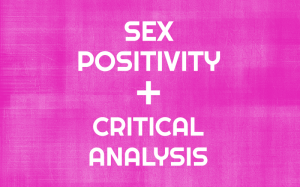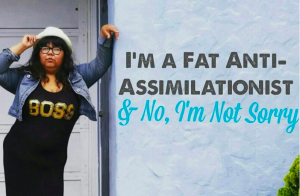
Source: EF
Editor’s Note: This piece is a critique of the mainstream sex-positivity movement and not of critically analytical sex-positive feminists. If your sex-positivity includes critical analysis, then right on! But if it doesn’t, then this article is for your consideration.
I’m a feminist, and I’m also a sex educator.
As such, I get a lot of people asking me to explain sex-positivity, usually under the assumption that I identify as sex-positive.
Which I don’t (quite) — at least, I don’t feel 100% committed to it yet.
And I want to talk about it.
According to everyone’s favorite oh-so-academic source, Wikipedia, the sex-positive movement is “a social movement which promotes and embraces sexuality with few limits beyond an emphasis on safer sex and the importance of informed consent.”
It’s, in the words of Allena Gabosch’s “A Sex Positive Renaissance,” “an attitude towards human sexuality that regards all consensual sexual activities as fundamentally healthy and pleasurable and encourages sexual pleasure and experimentation.”
Basically what it boils down to is 1) not making moral judgments, 2) respecting everyone’s personal preferences, and 3) encouraging people to be active agents in discovering what does (and doesn’t) make them tick.
And I’m not against this notion.
In fact, I’m all about it – both in theory and in praxis.
The problem for me comes in the way that many people practice sex-positivity – namely, without a critical analysis component.
I like what sex-positivity sets out to do, but there are factions of the movement that I think need a little work.
Sex-positivity isn’t about exclaiming “YEAH!” to every conversation around sex any more than feminism is about exclaiming “YEAH!” to any conversation about women.
There’s more to it than that.
The argument in sex-positivity, especially using a feminist framework, is that any decision that we make around our sexuality is inherently empowering because we exercised choice in the face of a society that tries to deny us that.
It’s the idea that if a person – particularly a woman – freely, openly, honestly, and enthusiastically engages in a sex act, then she is operating against the status quo, and isn’t that feminist?
And I’m not here to say whether or not any individual act or situation is feminist.
Rather, I want us to talk about some ways to think through the question instead of carelessly labeling everything an example of liberation in the name of sex-positivity.
So here are three points that I consider when I think through this stuff. And I’m hoping that you’ll also adopt them into your sex-positive attitudes in order to include more critical analysis in your thinking and in the movement as a whole.
1. We Don’t Make Decisions in a Vacuum
I wish we did. But we don’t.
It is entirely impossible for us to untangle ourselves from our socialization. It plays a part in every single thing that we do – including sex.
And while I (obviously) absolutely believe in and advocate for trying to unlearn the dangerous and oppressive messages that we’ve been handed down, I think it’s uninformed to assume that we are above them.
For example, I wear make-up. I like it. I think it’s fun. I think it’s pretty. I use it because for me, it’s an important part of my gender expression, and I actively make the personal choice to use it.
However, I’m also bombarded daily – and have been for my entire life – with the message that I’m ugly (and therefore, especially as a woman, worthless) without it.
Do I make my own choice every day about whether or not I want to put on make-up? Yeah. And can it be empowering for me to make a choice for myself? Sure.
But do I come to the conclusion to buy mascara in a vacuum? No.
So can I ever know for sure whether or not I’d still make the same decision under different circumstances? No. I can’t.
The same goes for sex.
A friend of mine who is also in the not-quite-but-almost-sex-positive camp recently brought up to me at a party the concept of bimbofication, which is a fetish involving women playing up the bimbo stereotype – from her looks (long, blonde hair; large breasts) to her personality (ditzy, man-pleasing, sexually available).
The question that my friend presented was: “What do you think of this?”
And at its core, that’s awesome. If you want to do that, cool. You’re an adult. Do what makes you happy. I want people to lead healthy, satisfying sex lives. If extensions, high heels, and an air of vapidness do that for you, rock on.
But on the other hand, I think it’s fair to go a step beyond that. Because I am curious about understanding why certain preferences exist: What messages are we receiving from society at large that are telling us that this is sexy? Is it coming from somewhere?
And I think that matters if we want to understand sexuality as a field.
At the end of the day, I’m always going to be all for people doing what makes them happy, so long as it’s consensual.
But my problem with sex-positivity without critical analysis is that it always ends there without engaging people in a conversation around how socialization affects the choices that we make.
And asking why doesn’t have to be judgmental. It can be curious. And I think that curiosity is (largely) missing from the mainstream movement.
2. Empowerment for One, But Oppression for All?
Let’s just jump right into talking about facials, since it’s been a popular topic in feminist discourse lately.
Again: Consenting adults? Awesome. Stay safe, folks.
But there has been a lot of conversation in the feminist community over the past few years about sex acts that are quote-unquote “degrading” in that they position women as submissive to men by playing out male-pleasure-centric tropes in pornography.
On the one hand, one argument is the sex-positive side: If I want a dude to ejaculate on my face – if I really, honestly want and like that – then isn’t it empowering to let him do it?
Sure. Maybe.
But the other side of the argument is: Maybe you think it’s awesome, but because we live in a society where women’s submissiveness to men is the status quo and in which penises are often weaponized (as in common phrases like “Suck my [bleep]”), then does this perpetuate rape culture? And if so, how can it ever, ever be feminist?
The same arguments can be (and is, tirelessly) applied to sex work: If a woman decides of her own accord that she wants to perform in pornography, feminism says that that should be sanctioned. But is pornography – particularly of the mainstream variety – empowering to women on a larger scale?
The argument is that just because it’s empowering for you personally doesn’t mean that it does women on the whole any good. So then the question becomes what is feminist, then? Your personal empowerment? Or the lifting up of a community? And how can one ever control the latter?
The truth is: There isn’t actually an answer here. There are a million other details to take into account, and there’s always the argument that any woman who is personally empowered is empowering women on the whole.
My issue here is that all of these arguments attempt to be black-and-white.
You’re either a sex-positive feminist – believing that your personal empowerment is paramount – or a sex-negative feminist – believing that if an act doesn’t directly oppose oppression, it isn’t empowering.
But these issues aren’t black-and-white. They’re not easy. They’re not one-size-fits-all. They deserve a conversation.
That’s what “sex-positivity with critical analysis” means for me.
3. A Redefined Status Quo
I’ve talked about this before – in my “Party Girl Pop” video and my “Conflating ‘Objectification’ with ‘Liberation’” article – and it isn’t anything that I came up with myself.
Both Susan J. Douglas and Ariel Levy, among others, have written on this topic extensively, and I recommend their work if you want to delve deeper into this.
But at the core of this issue is a question about whether or not the sexual availability and flexibility of women is really liberation or if it’s “new sexism.”
I teach kids. That’s what I do. That’s my life’s work. And when I ask my high school students to describe their ideal partner to me, the straight men will almost always – like, nine out of ten times – put “freak” on their list.
And when I ask them to elaborate, they always tell me that they want a partner who’s down for whatever and wants it all the time. Okay.
Similarly, in both my personal and professional lives, I have encountered people – mostly men – who (I’m assuming mostly through the pornification of our psychosexual development) have normalized sex acts that to some are still taboo.
From the seemingly innocent desire for anal sex to pushing boundaries around pain play to demanding participation in one-way-street fetishes, there is suddenly a lot of pressure on women to perform more and more daring sex acts.
What we’ve created is an expectation. And as soon as we create an expectation, we’re in dangerous territory.
Most feminists, I imagine, would agree that the pressure for women to get married and have children is an unfair gender expectation that should not be pushed onto all of us and that acquiescing to this standard may or may not be feminist, depending on your level of choice in the matter.
But if the “new normal” – or the “new ideal” – of womanhood is to be “sexually liberated” (most often seen as being appealing and pleasing to men, just openly), then how is that any different?
Where do we draw the line between what is authentically liberating and what is just sexism presented in a shiny new package?
Again: There is no easy answer here. There is no litmus test to determine whether your decision is yours or the product of surrounding pressures.
But when sex-positivity means assuming that all choices are automatically liberating, that we’ve moved so far beyond “real” sexism that women are now completely independent from patriarchal idealism, I can’t get on board.
***
Sex-positivity is a movement that arose from a need for us to accept and value sexuality without guilt, shame, and hurt.
I’m about that.
But when we stop asking hard questions in favor of assuming that everything is revolutionarily enlightened and therefore devoid of the intricacies of oppressive structures, I have to step back and question whether or not that’s a movement I want to be a part of.
And unless that critical analysis is present, I don’t.
[do_widget id=”text-101″]
Melissa A. Fabello, Co-Managing Editor of Everyday Feminism, is a sexuality educator, eating disorder and body image activist, and media literacy vlogger based out of Philadelphia. She enjoys rainy days, Jurassic Park, and the occasional Taylor Swift song and can be found on YouTube and Tumblr. She holds a B.S. in English Education from Boston University and an M.Ed. in Human Sexuality from Widener University. She is currently working on her PhD. She can be reached on Twitter @fyeahmfabello. Read her articles here and book her for speaking engagements here.
Search our 3000+ articles!
Read our articles about:
Our online racial justice training
Used by hundreds of universities, non-profits, and businesses.
Click to learn more
Most Read Articles
- « Previous
- 1
- …
- 30
- 31
- 32



















